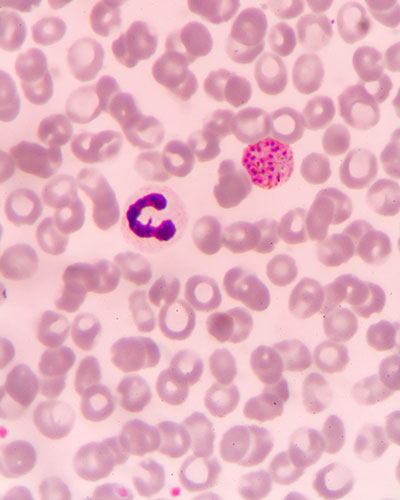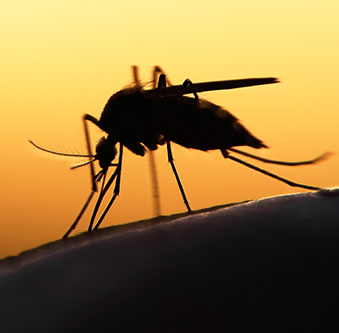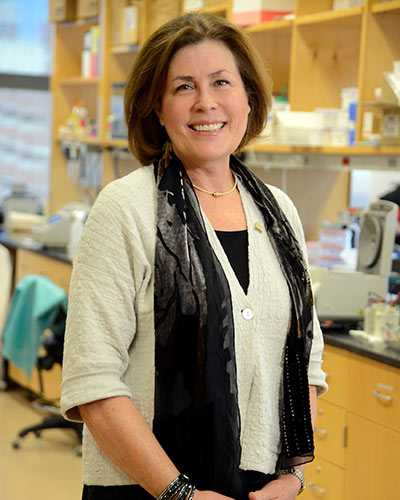February 08, 2019

Analyses of Plasmodium vivax Parasite RNAs Help Understand Transmission and Antimalarial Treatment Response
Scientists at the Institute of Genome Sciences (IGS) at the University of Maryland School of Medicine (UMSOM) have developed a novel way with genome sequences to study and better understand transmission, treat and ultimately eradicate Plasmodium vivax, the most widespread form of malaria.
P. vivax is a single-celled transmitted by mosquitoes. It is the most widespread human malaria parasite, responsible for more than 8.5 million clinical malaria cases worldwide and threatening more than two billion people in 90 countries. Unlike Plasmodium falciparum, another species of malaria, P. vivax cannot be cultured in vitro and remains poorly understood and resilient to elimination efforts.
IGS researchers teamed with researchers at the Institut Pasteur in Cambodia to analyze the parasite gene expression profiles from P. vivax malaria patients enrolled in a study to determine the effectiveness of chloroquine as a malaria treatment. Using a combination of genomic and bioinformatic approaches, they compared the parasite transcriptomes, or set of Ribonucleic acid (RNA) molecules, from different patient infections and analyzed how the parasites responded to chloroquine, a common antimalarial drug, according to the research, which was published in Nature Communications.
 “By analyzing the parasite mRNAs directly from infected patient blood samples, we were able to observe that not all infections contained the same proportion of the male and female parasites that are required for infecting mosquitoes and propagating the disease. This observation suggests that parasite transmission is more complex that we previously thought and, perhaps, that the parasite is able to modify its development to ensure optimal survival,” said David Serre, PhD, Associate Professor of Microbiology and Immunology and a member of IGS.
“By analyzing the parasite mRNAs directly from infected patient blood samples, we were able to observe that not all infections contained the same proportion of the male and female parasites that are required for infecting mosquitoes and propagating the disease. This observation suggests that parasite transmission is more complex that we previously thought and, perhaps, that the parasite is able to modify its development to ensure optimal survival,” said David Serre, PhD, Associate Professor of Microbiology and Immunology and a member of IGS.
Dr. Serre, who is Principal Investigator, said researchers analyzed the gene expression changes induced by chloroquine treatment and demonstrated that this antimalarial drug, while efficiently eliminating P. vivax parasites, acts differently that it does on P. falciparum parasites. “This emphasizes the biological differences between these two human malaria parasites and the importance to specifically study this important pathogen if we hope to eventually eliminate malaria worldwide,” he said.
Genome sequencing studies have provided unique insights on this neglected human parasite, but are limited to identifying biological differences encoded in the DNA sequence. However, gene expression studies, which could provide information on the regulation of the parasite life cycle and its response to drugs, have been challenging to implement for this pathogen due to the heterogeneous mixture of parasite stages present in every patient’s infection.
“This important research will help us better understand how to treat, prevent and ultimately eliminate this species of malaria. This is particularly critical amid a growing concern of drug resistance to antimalarial treatments,” said UMSOM Dean E. Albert Reece, MD, PhD, MBA, University Executive Vice President for Medical Affairs and the John Z. and Akiko K. Bowers Distinguished Professor.
Dr. Serre and Dr. Adam Kim at IGS, collaborated with Dr. Jean Popovici and Dr. Didier Menard at the Malaria Molecular Epidemiology Unit at the Institut Pasteur in Cambodia. This study was funded by a National Institutes of Health (NIH) grant awarded to Dr. Serre (R01 AI103228).
About the University of Maryland School of Medicine
Now in its third century, the University of Maryland School of Medicine was chartered in 1807 as the first public medical school in the United States. It continues today as one of the fastest growing, top-tier biomedical research enterprises in the world -- with 43 academic departments, centers, institutes, and programs; and a faculty of more than 3,000 physicians, scientists, and allied health professionals, including members of the National Academy of Medicine and the National Academy of Sciences, and a distinguished recipient of the Albert E. Lasker Award in Medical Research. With an operating budget of more than $1 billion, the School of Medicine works closely in partnership with the University of Maryland Medical Center and Medical System to provide research-intensive, academic and clinically-based care for more than 1.2 million patients each year. The School has over 2,500 students, residents, and fellows, and more than $530 million in extramural funding, with most of its academic departments highly ranked among all medical schools in the nation in research funding. As one of the seven professional schools that make up the University of Maryland, Baltimore campus, the School of Medicine has a total workforce of nearly 7,000 individuals. The combined School and Medical System (“University of Maryland Medicine”) has an annual budget of nearly $6 billion and an economic impact more than $15 billion on the state and local community. The School of Medicine faculty, which ranks as the 8th highest among public medical schools in research productivity, is an innovator in translational medicine, with 600 active patents and 24 start-up companies. The School works locally, nationally, and globally, with research and treatment facilities in 36 countries around the world. Visit medschool.umaryland.edu/
About the Institute for Genome Sciences
The Institute for Genome Sciences, founded in 2007, is an international research center within the University of Maryland School of Medicine. Comprised of an interdisciplinary, multidepartment team of investigators, the Institute uses the powerful tools of genomics and bioinformatics to understand genome function in health and disease, to study molecular and cellular networks in a variety of model systems, and to generate data and bioinformatics resources of value to the international scientific community.
igs.umaryland.edu
Contact
Office of Public Affairs
655 West Baltimore Street
Bressler Research Building 14-002
Baltimore, Maryland 21201-1559
Contact Media Relations
(410) 706-5260
Related stories

Wednesday, August 28, 2024
Leading Computational Scientist and Oncology Researcher Elana Fertig, PhD, Appointed as New Director of the Institute for Genome Sciences at the University of Maryland School of Medicine
University of Maryland School of Medicine (UMSOM) Dean Mark T. Gladwin, MD, announced today the appointment of Elana J. Fertig, PhD, FAIMBE, as the new Director of the School’s Institute for Genome Sciences (IGS). She is an internationally-recognized researcher known for her work in integrating spatial multi-omics technologies with mathematical models to develop a new predictive medicine paradigm in cancer. Spatial technologies allow researchers to learn about any cell type inside of natural tissue, including gene activity and cell interactions.

Thursday, July 28, 2022
Researchers Discover One of the Largest Known Bacteria-to-Animal Gene Transfer Inside a Fruit Fly
A fruit fly genome is not a just made up of fruit fly DNA – at least for one fruit fly species. New research from the University of Maryland School of Medicine’s (UMSOM) Institute for Genome Sciences (IGS) shows that one fruit fly species contains whole genomes of a kind of bacteria, making this finding the largest bacteria-to-animal transfer of genetic material ever discovered. The new research also sheds light on how this happens.

Tuesday, December 03, 2019
UM School of Medicine Researchers Institute for Genome Sciences' Researchers Discover Potential New Treatment for Tropical Parasitic Disease Using Genomics
Using innovative RNA sequencing techniques, researchers at the University of Maryland School of Medicine (UMSOM) Institute for Genome Sciences identified a promising novel treatment for lymphatic filariasis, a disabling parasitic disease that is difficult to treat. The potential new therapy is an experimental cancer drug called JQ1 and targets proteins found prominently in the worm’s genome; it appears to effectively kill the adult worms in a laboratory setting, according to the study which was published today in the journal mSystems.

Tuesday, August 13, 2019
Researchers Identify How Vaginal Microbiome Can Elicit Resistance or Susceptibility to Chlamydia
The vaginal microbiome is believed to protect women against Chlamydia trachomatis, the etiological agent of the most prevalent sexually transmitted infections (STIs) in developed countries. New research by the University of Maryland School of Medicine (UMSOM) shows how the microbiome can either protect or make a woman more susceptible to these serious infections.

Thursday, April 04, 2019
UM School of Medicine's Institute for Genome Sciences Awarded $17.5 Million Grant for Infectious Disease Research
The Institute for Genome Sciences (IGS) at the University of Maryland School of Medicine (UMSOM) was awarded $17.5 million from the National Institute of Allergy and Infectious Diseases (NIAID) to fund the IGS Genome Center for Infectious Diseases (GCID) for another five years.

Wednesday, March 27, 2019
New Study Finds That Bacteria and Immunity in the Cervix May be Key to Predicting Premature Birth
Spontaneous preterm birth (sPTB), defined as birth before 37 weeks of gestation, and the related complications, are the largest contributors to infant death in the United States and worldwide, according to the World Health Organization. Researchers at the University of Maryland School of Medicine (UMSOM) have discovered that bacteria and innate immune factors in a woman’s birth canal and cervix may increase the risk of spontaneous preterm birth or provide protection against such births.

Tuesday, February 12, 2019
UMSOM Scientists Call for Unrestricted Usage of Public Genome Data
Researchers at the Institute for Genome Sciences (IGS) at the University of Maryland School of Medicine (UMSOM) called for open access to genome data, stating that unrestricted usage is needed for progress in combating the world’s most serious diseases.

Thursday, September 27, 2018
University of Maryland School of Medicine Scientist Receives Prestigious Microbiome Award
Owen White, PhD, professor of epidemiology and public health, and Associate Director for Informatics at the Institute for Genome Sciences (IGS) at the University of Maryland School of Medicine (UMSOM), has received the 2018 Microbiome Pioneer Award. The prestigious honor is part of the Bioinformatics for the Microbiome Symposium organized by Stanford University. The microbiome is the name given collectively to the community of trillions of microbial organisms that live on and within our bodies.

Monday, May 14, 2018
New Research: Some Gut Bacteria May Protect Against Intestinal Infection
Scientists at the University of Maryland School of Medicine (UMSOM) have for the first time found evidence that the presence of a key species in the human gut microbiome is associated with protection from infection with typhoid fever. If the research is borne out, it could offer an exciting new way to reduce intestinal infections from microbes.

Wednesday, May 25, 2016
UMSOM Researchers Develop New Way to Decode Large Amounts of Biological Data
A University of Maryland School of Medicine researcher has helped develop an innovative computing technique that, on very large amounts of data, is both faster and more accurate than current methods. To spur research, a program using this technique is being offered for free to the biomedical research community.
